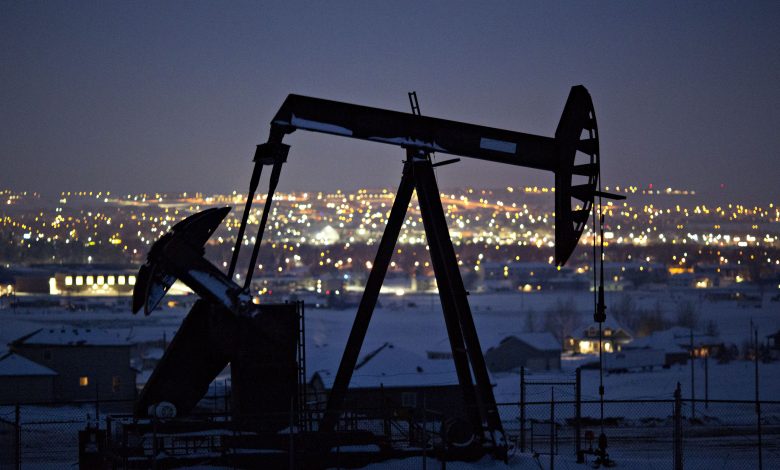The losers of the price war between Saudi Arabia and Russia

[ad_1]
Russian Energy Minister Alexander Novak and Saudi Energy Minister Abdulaziz Bin Salman sign documents during a ceremony following a meeting of Russian President Vladimir Putin with Saudi Arabia’s King Salman in Riyadh, Saudi Arabia, on October 14, 2019.
ALEXEY NIKOLSKY | SPUTNIK | AFP via Getty Images
An intensifying oil price war between Saudi Arabia and Russia has created “very painful” market conditions for the world’s largest crude producers, analysts have told CNBC, with many braced for sliding revenues over the coming months.
International benchmark Brent crude traded at $34.23 Thursday morning, down over 4.4%, while U.S. West Texas Intermediate (WTI) stood at $31.64, around 4% lower. Oil prices have almost halved since the start of the year.
The downturn for crude futures comes shortly after talks between OPEC kingpin Saudi Arabia and non-OPEC leader Russia broke down.
Markets had been hoping for an agreement between Riyadh and Moscow, as well as other OPEC and non-OPEC producers, in order to deepen oil output cuts and prop up prices.
The group’s unexpected failure to reach a consensus on production policy led oil prices to crash on Monday.
President Donald Trump’s surprise announcement Wednesday to ban travel from continental Europe following the WHO’s declaration that the coronavirus can now be described as a pandemic also acted as a catalyst for further oil price losses Thursday morning.
What does a price war mean for US shale?
Most energy analysts have dismissed the idea that Saudi Arabia and Russia’s price war has been specifically designed to target U.S. shale, but the industry is expected to bear the brunt of the pain.
Securing America’s Future Energy (SAFE), a think tank that advocates for reducing U.S. dependence on oil, believes the American oil industry is the loser from the current price war.
“Saudi Arabia claims to be the swing producer to stabilize the market, but mostly they just cause swings that hurt the free market and the ability to compete,” Robbie Diamond, president and CEO of SAFE, said via email shortly after OPEC and non-OPEC allies failed to reach an agreement.
“Our industry and the U.S. economy has no choice but to watch once again as Saudi Arabia tanks the price of oil to suit its domestic priorities,” he added.
A pumpjack operates above an oil well at night in the Bakken Formation on the outskirts of Williston, North Dakota, U.S., on Thursday, March 8, 2018.
Bloomberg | Bloomberg | Getty Images
Trump initially welcomed the declaration of a price war between Saudi Arabia and Russia, hailing lower oil prices as good news for U.S. consumers.
Saudi Arabia has since signaled its intent to flood the market with crude, unveiling plans Wednesday for state-owned Saudi Aramco to ramp up production to 13 million barrels per day (bpd).
It is thought such a move could prompt a wave of bankruptcies and investment cuts in the U.S. which, in turn, would have a noticeable impact on shale production.
IEA says OPEC allies are in a ‘very, very difficult situation’
Some believe the worst hit from a sharp drop in oil prices will be long-time allies of de facto OPEC leader, Saudi Arabia.
“My main worry today is not on shale,” Fatih Birol, executive director of the International Agency (IEA), told CNBC’s Steve Sedgwick earlier this week.
“It is mainly on some of the major oil-producing countries who have not — despite the calls from the IEA many, many times — diversified their economies.”
Birol suggested countries like Iraq, Algeria and Nigeria — all OPEC producers — were in a “very, very difficult situation” and would require support from the rest of the world.
“They are facing major fiscal strains. Many of them will have difficulties to pay the salaries for the public sector, spending for health, for education, which in turn may provide social pressures in those countries.
Iraq, OPEC’s second-largest producer, is thought to be particularly exposed to an all-out price war because it has one of the least diversified economies of the producer group — despite relatively low production costs.
Iraq’s oil ministry said Tuesday that it will keep in touch with other OPEC and non-OPEC members in an effort to prevent an oil price collapse, Reuters reported.
What about the instigators of the price war?
Shortly after talks broke down with Saudi Arabia late last week, Russia claimed it could withstand lower oil prices for as long as a decade.
Yet, while many believe Moscow is in much stronger financial position to cope with a protracted period of lower oil prices than in previous years, it is not thought to be in the best interests of Russia or Saudi Arabia.
“If you assume that the price difference between agreeing and rejecting last week’s recommendation is $25 (a barrel) then Russia stands to lose a considerable amount of money by not endorsing the proposal,” Tamas Varga, senior analyst at PVM Oil Associates, said in a research note.
“There will come a point when the negative consequences of Russia’s decision will become unbearable for the instigator,” he added.
On Tuesday, Russian Energy Minister Alexander Novak appeared to keep the door open for Moscow and Riyadh to return the negotiating table in order to stabilize markets.
Chris Weafer, a senior partner at Macro-Advisory, told CNBC’s “Squawk Box Europe” on Tuesday that a reaction from the world’s second and third-largest oil producers would be inevitable.
“Even at $30, something is going to happen. The Saudis are going to have to do something because they need a higher price. The U.S. shale industry cannot afford that low price.”
“We are not going to stay here. We can’t,” Weafer said.
Source link






